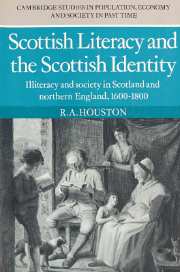 Scottish Literacy and the Scottish Identity
Scottish Literacy and the Scottish Identity Book contents
- Frontmatter
- Contents
- Tables
- Abbreviations
- Preface
- 1 The ideal of Scottish literacy
- 2 Structures and trends in illiteracy in the seventeenth and eighteenth centuries
- 3 Illiteracy in mid seventeenth-century Britain
- 4 The reasons for literacy
- 5 Measures of literacy
- 6 Oral culture and literate culture
- 7 The politics of literacy
- 8 Literacy and the Scottish identity
- Appendices
- Bibligraphy
- Index
7 - The politics of literacy
Published online by Cambridge University Press: 11 November 2009
- Frontmatter
- Contents
- Tables
- Abbreviations
- Preface
- 1 The ideal of Scottish literacy
- 2 Structures and trends in illiteracy in the seventeenth and eighteenth centuries
- 3 Illiteracy in mid seventeenth-century Britain
- 4 The reasons for literacy
- 5 Measures of literacy
- 6 Oral culture and literate culture
- 7 The politics of literacy
- 8 Literacy and the Scottish identity
- Appendices
- Bibligraphy
- Index
Summary
Despite the continued importance of oral forms, the claims made for literacy and education both by early modern reformers and by later historians have been far from modest. We noticed in chapter 4 how difficult it is to explain why and how men and women came to learn reading and writing. In chapter 6 we also introduced the idea that historians have been influenced by a powerful intellectual tradition, which assumes that literacy is automatically a benefit to individual and society, and a value–free one at that. In Tolstoy's Anna Karenina, Levin's brother Koznyshev asks rhetorically: 'Can there be two opinions on the advantage of education? If it's a good thing for you, it's a good thing for everyone.' This assumption, implicit and explicit, pervades writing on literacy and education.
At the same time the broad outlines of literacy attainments which we demonstrated in chapter 2 are really only a starting–point for understanding the various implications of the ability to read and write. Statistics are important if we are to test our assumptions about literacy and to generate new hypotheses which we can investigate. However, we must also explain the patterns which we uncover and unravel their importance by placing them in the context of the society as a whole. Harvey Graff sums up the importance of context very neatly when he observes that 'The measurement of the distribution of literacy in a given population may reveal relatively little about the uses to which those skills could be put and the demands they could meet.'
- Type
- Chapter
- Information
- Scottish Literacy and the Scottish IdentityIlliteracy and Society in Scotland and Northern England, 1600–1800, pp. 211 - 255Publisher: Cambridge University PressPrint publication year: 1985
